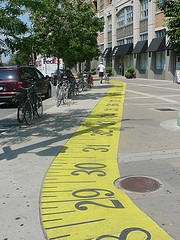Keeping motivated in your tracking
Matthew Cornell
July 1, 2011
 I recently received an email from someone having trouble keeping up with her experiment. While there is lots of general advice about discipline and motivation, this got me thinking about how doing personal experiments might differ. Following are a few brief thoughts, but I’d love to hear ways that you keep motivated in your quantified self work.
I recently received an email from someone having trouble keeping up with her experiment. While there is lots of general advice about discipline and motivation, this got me thinking about how doing personal experiments might differ. Following are a few brief thoughts, but I’d love to hear ways that you keep motivated in your quantified self work.
The desire to get an answer. The main point of an experiment is to get an answer to the initial question. “Will a Paleo diet help me manage my weight?” “Does talking less bring me closer to my kids?” Maybe the principle at play is that experiments which motivate start with great questions.
Built-in progress indicators. If you’ve set up your experiment well, you should have measures that come in regularly enough to keep you interested. This is assuming, of course, that you care about the results, i.e., that you’ve linked data and personal meaning (see below). But unlike other types of projects, maybe we can use the periodic arrival of measurements to stimulate our motivation, such as celebrating when new results appear.
The joy of satisfying a mental itch. Curiosity is a deep human motivation, and experiments have the potential of giving your brain a tasty shift – such as when you are surprised by a result. I especially like when a mental model of mine is challenged by a result. Well, sometimes I like it.
Sharing with like-minded collaborators. At a higher level of motivation, experimenting on yourself is an ideal framework for collaboration with folks who are either 1) interested in your particular topic (e.g., sleeping better or improving your marriage), or 2) are living an experiment-driven life. It is encouraging to get together with people to share your work, and to receive support, feedback, and ideas. Of course it feels good to so the same for them.
Desire to make a change. Finally, if we come back to why we experiment, there should be a strong self-improvement component to what we are tracking. My argument is that, ultimately, it’s not about the data, but about making improvements in ourselves for the purpose of being happier. If the change you are trying is not clearly leading that direction, then it might make sense to drop it and try something more direct. Fortunately, with self-experimentation there is usually something new you can try.
Underlying all of these, however, is the fact that the work of experimentation takes energy. Every step of an experiment’s life-cycle involves effort, from thinking up what you’ll do (creating a useful design), through running the experiment (capturing and tracking data), to making sense of the results (e.g., the “brain sweat” of analysis). Given our crazy-busy lives, there are times when we simply can’t take on another responsibility. So if you find yourself flagging and losing interest in one of your self-experiments, then maybe that is itself some data. Thoughts?
[Image from Steve Harris]


